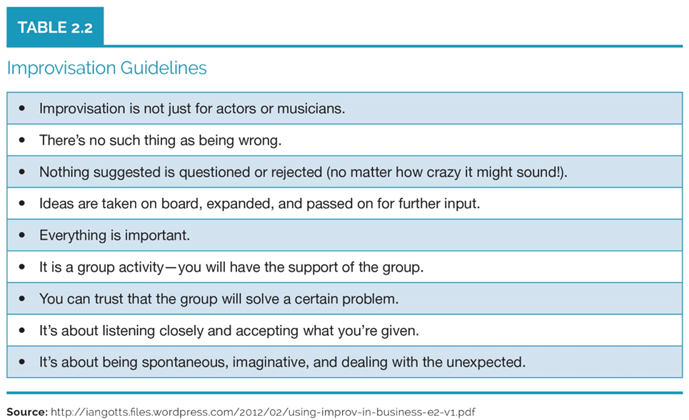Topic 5: Soft Skills for being an entrepreneur
Self-leadership is described as a process whereby people can influence and control their own behaviour, actions and thinking to achieve the self-direction and self-motivation necessary to build their entrepreneurial business ventures.
It can be lonely, often no one is around to give you feedback, reprimand you or reward you.
Self leadership consists of three main strategies; behaviour-focused strategies, natural reward strategies; and constructive thought pattern strategies.

Self observation: raises our awareness of how, when, and why we behave the way we do by asking ourselves regularly these questions. This is the first step towards addressing unhelpful or unproductive behaviour.
Self goal setting: the process of setting individual goals for ourselves. This is especially productive if accompanied by self-reward-ways in which we compensate ourselves when we achieve our goals. These rewards can be tangible or intangible.
Self-punishment or self-correcting feedback is a process that allows us to examine our mistakes before making a conscious effort not to repeat them.
Self cueing is a process of prompting that acts as a reminder of desired goals and keeps your attention on what you are trying to achieve.

The entrepreneurial mindset is about understanding who you are and how you view the world. It deeply connects to your desired impact which some people equate with passion. In the past, people tended to use passion as a reason to explain certain behaviours displayed by entrepreneurs that were thought to be unconventional, such as perceived high risk taking, intense focus and commitment, and dogged determination to fulfil a dream.
Passion is not all that is needed to be successful, but research has shown that positive feelings motivate entrepreneurs to persist and engage in tasks and activities in order to maintain those pleasurable emotions.
Passion is an intense positive emotion, motivating and stimulating entrepreneurs to overcome obstacles and remain focused on their goals.
It can enhance mental activity, foster creativity and provide meaning to everyday work.
But be careful: Passion can also lead to becoming blinded by it and obsessed by an idea or new venture. It may result in ignoring the warning signs and negative feedback.

It is important to understand how to develop the habit of creativity by using constructive thought patterns, what it takes to develop a creative mind (left- vs. right-brain orientation) and how to deal with fear.
Following Websites and blogs are helpful to learn about creative techniques:
https://en.wikipedia.org/wiki/Creativity_techniques
The way human brains are structured reflects the importance of navigating the uncharted waters of an uncertain world in the history of mankind.
You may have heard about people being left-brained or right-brained. There is little scientific support for this model.
It does, however, corroborate with some research on personality traits of creative people (Csinkszentmihalyi, 1996). The research showed that these people exhibited seemingly polarized traits like discipline and playfulness, a strong sense of reality and vivid imagination, and pride and humility. If you compare the „polarized“ traits with the left and right brain characteristics you will see striking similarities, suggesting that creativity involves integrating „both sides“ of the brain.
Although successful entrepreneurs definitely do not fit into a single profile, there is some commonality in their mindset. They envision success while also preparing for failure. They value autonomy in deciding and acting and, therefore, assume responsibility for problems and failures. They have a tendency of being intolerant of authority, exhibit good salesmanship skills, have high self-confidence, and believe strongly in their abilities. They also tend to be both optimistic and pragmatic. They work hard and are driven by an intense commitment to the success of the organization.
Some points you should consider enhancing your creativity:
- There is some evidence that entrepreneurs are more creative than others.
- Human beings are inherently creative, but creativity can be honed and developed.
- Develop the habit of creativity by using constructive thought patterns!

The concept of improvisation is rooted in the musical genre of jazz, and theater arts (Kamoche and Cunha 2001). Organizational improvisation is a behavioral dynamic based on multilateral interactions characterized by a high convergence of planning and execution (Moorman and Miner 1998). Entrepreneurial improvisation, as the entrepreneurial team-level version of organizational improvisation, can be defined as “the conception of entrepreneurial action as it unfolds, drawing on available material, cognitive, affective and social resources” (Cunha et al. 1999), and can be distinguished by entrepreneurial behaviors that are deliberate but are unplanned and creative, and deal with emergencies and bricolage (Vera and Crossan 2005).
Be aware that improvisation becomes more and more important, as it is easier to function in a world of uncertainty.

